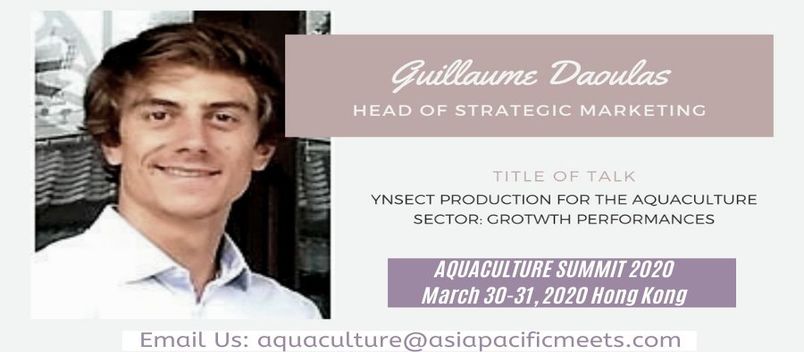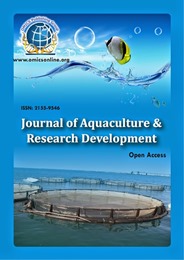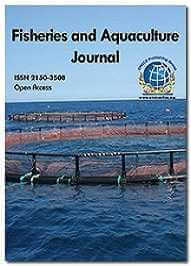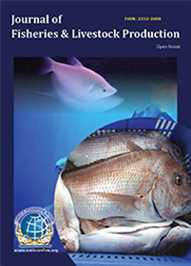Theme: Innovative and Sustainable Aquaculture
Aquaculture Summit 2020
JOIN US @
AQUACULTURE SUMMIT 2020
November 04-05, 2020 Sydney, Australia
We appreciate all our wonderful Keynote Speakers, Speakers, Conference Attendees, Students, Media Partners, Associations, Sponsors and Exhibitors for making “12th Global Summit on Aquaculture & Fisheries” during November 04-05, 2020 Sydney, Australia.
After the successful completion of the “Aquaculture Summit 2020” event, Conference Series LLC Ltd, Scientific Event Organizer and the World Class Open Access Publisher with great pride and honour invites all the participants from all over the world to attend “12th Global Summit on Aquaculture & Fisheries” (Aquaculture Summit 2020) slated on November 04-05, 2020 Sydney, Australia which covers on all aspects of the Aquaculture & Fisheries Sciences, manufacturing, quality with strong emphasis on originality and scientific quality. This Aquaculture Summit 2020 setting a platform for all the budding Scientists and Researchers to present their real-time work and share their views and aspects related to the theme of the Conference. The Organizing committee is gearing up for an exciting and informative conference program including plenary Lectures, Symposia, Workshops on a variety of topics, Poster presentations and various programs for participants from all over the World.
Aquaculture Summit 2020 is based on the theme “Innovative and Sustainable Aquaculture”. This gathering will cover the innovative methods, the most recent techniques and new research systems, developments, and the newest updates in Aquaculture, Fisheries and Marine biology.
Fish and other seafood represent a copious and in a progressively important source of healthy food for a developing world population. On aquaculture systems researchers focus on how automation and its accompanying is permitting skills such as smart sensors and monitoring systems. Aquaculture Summit 2020 offers a sole opportunity for researchers across the globe to meet, network, and perceive new scientific novelties. The process of data collecting, testing or analysing, decision-making, expectancies of capitals and formulation and application, with implementation as necessary, of regulations or rules which govern fisheries activities to confirm the continued efficiency of the resources and the completion of other fisheries objectives. Anyone of these arrangements can function effectively, given an adequate legal agenda in which to operate and the capitals necessary to satisfy their function.
Why attend Aquaculture Summit 2020: Benefits in attending
So why attend conferences? We each have our own reasons for attending………..
Conferences are a great way to learn from the experts in the field that you’re working in. Every experience is worth your attention, and there are lessons to be learned from it. Every new lesson is useful in your field of expertise. Developing a strong professional network has become one of the key prerequisites for professional success. Attendees from other companies and from other areas of the country can become valuable resources for referrals, new ways of thinking, solutions, and best practices.
The focused nature of learning at our conference allows you to dig deeper with the understanding of your topic of interest.
Meet new people & Expand network:
Attending Aquaculture Summit 2020 is an opportunity for you to meet new people in the field of Aquaculture and Fisheries.
This Conference enable you to expand your network, you meet people from all walks of life in the same industry. It widens your reach and gets referrals from these people, which can help your business in one way or another. From this perspective, conferences expand your current network and you are bound to build another one.
Keep with the current trends:
In Aquaculture Summit 2020 event, most of the topics talk about the current problems and the long-term solution to it. It does not just talk about the now, but what’s in store for the upcoming years in Aquaculture & Fisheries Sciences. This event gives you several ideas on the current trends and how to utilize them to your own advantage.
· Keynote presentation along with interactions to galvanize the scientific community.
· Workshop and symposiums to reach the largest assemblage of participants from the Agri, Food and Aqua community.
· A wide track of exhibitors to showcase the new and emerging technologies.
· Platform to global investment community to connect with stakeholders in Aquaculture & Fisheries sector.
· Young Scientist/ Investigators Award geared towards best budding young research.
· Links to the political marketing resources to expand your business and research network.
· Triumph of Awards, Certificates recognizes your commitment to your profession to encourage the nascent research.
Aquaculture Summit 2020 Motto:
Open panel discussions: Providing an open forum with experts from academia and business to discuss on current challenges in Aquaculture & Fisheries Sciences, where all attendees can interact with the panel followed by a Q&A session.
Speaker and poster presentations: Providing a platform to all academicians and industry professionals to share their research thoughts and findings through a speech or a poster presentation.
Editorial board meeting: Discussing on growth and development of open access Journal of Aquaculture Research & Development and recruiting board members and reviewers who can support the journal.
Round table meetings: Providing a platform where industry professionals meet academic experts.
Over 50+ organizations and international pavilions will be exhibiting at the Aquaculture Summit 2020 event. Exhibitors will include equipment manufacturers and suppliers, systems providers, finance and investment firms, R&D companies, project developers, trade associations, and government agencies.
In addition to the products and services you will have access to valuable content, including Keynote Presentations, Product Demonstrations and Educational Sessions from today’s industry leaders.
The Aquaculture Summit 2020 has everything you need, all under one roof, saving you both time and money. It is the event you cannot afford to miss!!!
A two-day gathering that examines the future market patterns, creative business methodologies and open doors for development of moderate medications. Aquaculture and Fisheries pioneers want the substance and roundtable examinations yet remain for the systems administration and air. This meeting is formally the biggest key nonexclusive gathering in the business and will give members a thorough survey of business methodology for moderate meds.
Position your organization as an industry pioneer
Make deals leads and convey an arrival on venture
Connect with your objective market in the locale.
Who Should Attend and Target Audience 2020:
Directors/Senior Directors/Executive Directors and Vice Presidents/Senior Vice Presidents/Executive Vice Presidents and Heads/Leaders/Partners of
· CROs and CMOs
· Directors, CEO’s of Organizations
· R&D Researchers from Aquaculture & Fisheries Industries
· Professors, Associate Professors, Assistant Professors
· PhD Scholars
· Noble laureates in Aquaculture, Fisheries and Marine biology
· Marine biology Professionals
· Aquaculture & Fisheries Colleges
· Aquaculture & Fisheries Faculty
· Research Institutes and members
· Aquaculture & Fisheries industries
· Marine biology Professionals
· Aquaculture & Fisheries Students, Scientists
· Manufacturing Companies and Supply Chain Companies
· Business Entrepreneurs
· Aquaculture & Fisheries Associations and Societies
· Aquaculture & Fisheries Training Institutes
Thankfully, Air travellers won’t need to go out of their way to experience the multitude of shopping, dining and entertainment experiences on offer at the Airport’s.
Track 1: Aquaculture and Fisheries - Facts/Methods
Aquaculture means farming of aquatic organisms including fish, mollusks, and aquatic plants. It refers to breading, rearing and harvesting in all types of water environments. Fisheries refer to act of culturing, preserving, marketing, developing and managing the aquatic resource. Fishery needs to manage by seeking balance in the situation where fishing impacts multiple stocks to create tradeoffs.
Related: Aquaculture Conference | Fisheries Conference | Marine Biology Conference | Animal Welfare Conference| Aquaculture & Marine Biology Conference | Aquaculture and Fisheries Meetings | Marine Science Conference | Aquatic Science Conference | Fisheries Science Meeting | International Aquaculture and Fisheries Conferences
Global Fisheries & Aquaculture Societies: Asian Fisheries Society | China Society of Fisheries, China | Korean Society of Fisheries and Sciences (KOSFAS), Korea | Aquaculture Association of Canada, Canada | Aquaculture Association of S. Africa, South Africa | European Aquaculture Society, Europe | Brazilian Aquaculture Society (AQUABIO), Brazil | Indonesian Aquaculture Society, Indonesia | Society of Aquaculture Professionals, India | Malaysian Fisheries Society, Malaysia | Egyptian Aquaculture Society, Egypt | Spanish Aquaculture Association (SEA), Spain
Track 2: Fisheries Sciences
Fisheries Science is a department of marine science that offers with studies on the existence history and state of fish stocks. The term ‘existence history’ refers to the widely wide-spread biology of a fish stock. The time period ‘state of a fish stock’ refers to the range and weight of fish in the stock i.e. current stock biomass in tonnes.
Related: Aquaculture Conference | Fisheries Conference | Marine Biology Conference | Animal Welfare Conference| Aquaculture & Marine Biology Conference | Aquaculture and Fisheries Meetings | Marine Science Conference | Aquatic Science Conference | Fisheries Science Meeting | International Aquaculture and Fisheries Conferences
Global Fisheries & Aquaculture Societies: Asian Fisheries Society | China Society of Fisheries, China | Korean Society of Fisheries and Sciences (KOSFAS), Korea | Aquaculture Association of Canada, Canada | Aquaculture Association of S. Africa, South Africa | European Aquaculture Society, Europe | Brazilian Aquaculture Society (AQUABIO), Brazil | Indonesian Aquaculture Society, Indonesia | Society of Aquaculture Professionals, India | Malaysian Fisheries Society, Malaysia | Egyptian Aquaculture Society, Egypt | Spanish Aquaculture Association (SEA), Spain
Track 3: Animal Welfare in Aquaculture
Aquaculture is an important farming activity in EU. Farming of fish has increased in recent years and science to access welfare is evolving. Fish nurture in aquaculture systems faces numerous welfare challenges. The development and implementation of appropriate production facilities to ensure the well-being of growing numbers of farmed fish are critical. A key welfare problem for farm fish is infection by disease and parasite. To align welfare issues should follow some welfare rules for freedom fish like Freedom from hunger and thirst, discomfort, pain, and injury, from fear and stress.
Related: Aquaculture Conference | Fisheries Conference | Marine Biology Conference | Animal Welfare Conference| Aquaculture & Marine Biology Conference | Aquaculture and Fisheries Meetings | Marine Science Conference | Aquatic Science Conference | Fisheries Science Meeting | International Aquaculture and Fisheries Conferences
Global Fisheries & Aquaculture Societies: Asian Fisheries Society | China Society of Fisheries, China | Korean Society of Fisheries and Sciences (KOSFAS), Korea | Aquaculture Association of Canada, Canada | Aquaculture Association of S. Africa, South Africa | European Aquaculture Society, Europe | Brazilian Aquaculture Society (AQUABIO), Brazil | Indonesian Aquaculture Society, Indonesia | Society of Aquaculture Professionals, India | Malaysian Fisheries Society, Malaysia | Egyptian Aquaculture Society, Egypt | Spanish Aquaculture Association (SEA), Spain
Track 4: Sustainability in Aquaculture
Aquaculture and fishery are one of the important sectors in the economy. Sustainable aquaculture is a dynamic concept and sustainability vary with species, location and, state of knowledge and technology. Aquaculture should have environmental as well as economic sustainability. Sustainability of species depends on feeding and lifecycle habitats. Aquaculture can improve the sustainability of small scales farms. Multiple uses of water are an important aspect of the sustainable aquaculture system.
Related: Aquaculture Conference | Fisheries Conference | Marine Biology Conference | Animal Welfare Conference| Aquaculture & Marine Biology Conference | Aquaculture and Fisheries Meetings | Marine Science Conference | Aquatic Science Conference | Fisheries Science Meeting | International Aquaculture and Fisheries Conferences
Global Fisheries & Aquaculture Societies: Asian Fisheries Society | China Society of Fisheries, China | Korean Society of Fisheries and Sciences (KOSFAS), Korea | Aquaculture Association of Canada, Canada | Aquaculture Association of S. Africa, South Africa | European Aquaculture Society, Europe | Brazilian Aquaculture Society (AQUABIO), Brazil | Indonesian Aquaculture Society, Indonesia | Society of Aquaculture Professionals, India | Malaysian Fisheries Society, Malaysia | Egyptian Aquaculture Society, Egypt | Spanish Aquaculture Association (SEA), Spain
Track 5: Aquaculture Nutrition
Aquacultures are simply defined as aquatic organisms. Fish require the same nutrients that all animals require for health and reproductive growth. It includes proteins, minerals, and vitamins. The main objective of aquaculture nutrition is to balance the food portion which should be composed of fish meal and fish oil at the average rate. Improved efficiencies in aquatic nutrition and aqua feed development are essential to the long-term development of local aquaculture industry.
Related: Aquaculture Conference | Fisheries Conference | Marine Biology Conference | Animal Welfare Conference| Aquaculture & Marine Biology Conference | Aquaculture and Fisheries Meetings | Marine Science Conference | Aquatic Science Conference | Fisheries Science Meeting | International Aquaculture and Fisheries Conferences
Global Fisheries & Aquaculture Societies: Asian Fisheries Society | China Society of Fisheries, China | Korean Society of Fisheries and Sciences (KOSFAS), Korea | Aquaculture Association of Canada, Canada | Aquaculture Association of S. Africa, South Africa | European Aquaculture Society, Europe | Brazilian Aquaculture Society (AQUABIO), Brazil | Indonesian Aquaculture Society, Indonesia | Society of Aquaculture Professionals, India | Malaysian Fisheries Society, Malaysia | Egyptian Aquaculture Society, Egypt | Spanish Aquaculture Association (SEA), Spain
Track 6: Shellfish Farming
Shellfish farming helps to improve sediment quality by loosening and dispersing silt and muck, and helps add oxygen to bottom waters and sediments. Filter-feeding bivalve molluscs are an essential link between the bottom-dwelling aquatic communities and phytoplankton production in the water column. Shellfish are highly efficient water filters that directly remove particulate material thus reducing turbidity and both directly and indirectly removing nitrogen and other nutrients. Via this process, these highly efficient water purifiers remove or reduce organic matter, nutrients, silt, bacteria and viruses, and improve clarity and light transmission which, in turn, improves the condition of critical habitat, including survival of critical habitat species such as sea grasses and other submerged vegetation.
Related: Aquaculture Conference | Fisheries Conference | Marine Biology Conference | Animal Welfare Conference| Aquaculture & Marine Biology Conference | Aquaculture and Fisheries Meetings | Marine Science Conference | Aquatic Science Conference | Fisheries Science Meeting | International Aquaculture and Fisheries Conferences
Global Fisheries & Aquaculture Societies: Asian Fisheries Society | China Society of Fisheries, China | Korean Society of Fisheries and Sciences (KOSFAS), Korea | Aquaculture Association of Canada, Canada | Aquaculture Association of S. Africa, South Africa | European Aquaculture Society, Europe | Brazilian Aquaculture Society (AQUABIO), Brazil | Indonesian Aquaculture Society, Indonesia | Society of Aquaculture Professionals, India | Malaysian Fisheries Society, Malaysia | Egyptian Aquaculture Society, Egypt | Spanish Aquaculture Association (SEA), Spain
Track 7: Environmental Impacts in Aquaculture
Impacts of aquaculture on the environment are increasing. The main influence of aquaculture on water quality is to increase the suspended substances and the nutritional salts in water. It is an important issue as aquaculture expands globally. In South East Asia shellfish are produced heavily and poorly managed. Farmed fish are generally free from environmental contaminants such as heavy metals. Environmental impacts of aquaculture are dependent upon the species farmed.
Related: Aquaculture Conference | Fisheries Conference | Marine Biology Conference | Animal Welfare Conference| Aquaculture & Marine Biology Conference | Aquaculture and Fisheries Meetings | Marine Science Conference | Aquatic Science Conference | Fisheries Science Meeting | International Aquaculture and Fisheries Conferences
Global Fisheries & Aquaculture Societies: Asian Fisheries Society | China Society of Fisheries, China | Korean Society of Fisheries and Sciences (KOSFAS), Korea | Aquaculture Association of Canada, Canada | Aquaculture Association of S. Africa, South Africa | European Aquaculture Society, Europe | Brazilian Aquaculture Society (AQUABIO), Brazil | Indonesian Aquaculture Society, Indonesia | Society of Aquaculture Professionals, India | Malaysian Fisheries Society, Malaysia | Egyptian Aquaculture Society, Egypt | Spanish Aquaculture Association (SEA), Spain
Track 8: Aquaculture Disease and Health Management
The infectious disease poses one of the most significant threats to successful aquaculture. Negative environmental effects may occur serious oxygen shortage caused by disintegrating natural substances. There will be no treatment for viral diseases. Most of the fish diseases are restricted to fish and poses no risk to handlers. It’s essential to report any infections or diseases to fish as quickly as time permits. This leads to early administration and regulation of pathogens for the regular environment.
Related: Aquaculture Conference | Fisheries Conference | Marine Biology Conference | Animal Welfare Conference| Aquaculture & Marine Biology Conference | Aquaculture and Fisheries Meetings | Marine Science Conference | Aquatic Science Conference | Fisheries Science Meeting | International Aquaculture and Fisheries Conferences
Global Fisheries & Aquaculture Societies: Asian Fisheries Society | China Society of Fisheries, China | Korean Society of Fisheries and Sciences (KOSFAS), Korea | Aquaculture Association of Canada, Canada | Aquaculture Association of S. Africa, South Africa | European Aquaculture Society, Europe | Brazilian Aquaculture Society (AQUABIO), Brazil | Indonesian Aquaculture Society, Indonesia | Society of Aquaculture Professionals, India | Malaysian Fisheries Society, Malaysia | Egyptian Aquaculture Society, Egypt | Spanish Aquaculture Association (SEA), Spain
Track 09: Fishery Resource Analysis and Monitoring
The Fishery Resource Analysis and Monitoring, monitors ground fish and halibut fishing activities in the Federal fisheries off Alaska and conducts research associated with sampling commercial fishery catches, estimation of catch and by catch mortality, and analysis of fishery-dependent data. The division is responsible for training, briefing, debriefing, and oversight of observers who collect catch data onboard fishing vessels and at onshore processing plants and for quality control/quality assurance of the data provided by these observers.
Related: Aquaculture Conference | Fisheries Conference | Marine Biology Conference | Animal Welfare Conference| Aquaculture & Marine Biology Conference | Aquaculture and Fisheries Meetings | Marine Science Conference | Aquatic Science Conference | Fisheries Science Meeting | International Aquaculture and Fisheries Conferences
Global Fisheries & Aquaculture Societies: Asian Fisheries Society | China Society of Fisheries, China | Korean Society of Fisheries and Sciences (KOSFAS), Korea | Aquaculture Association of Canada, Canada | Aquaculture Association of S. Africa, South Africa | European Aquaculture Society, Europe | Brazilian Aquaculture Society (AQUABIO), Brazil | Indonesian Aquaculture Society, Indonesia | Society of Aquaculture Professionals, India | Malaysian Fisheries Society, Malaysia | Egyptian Aquaculture Society, Egypt | Spanish Aquaculture Association (SEA), Spain
Track 10: Aquatic and Marine Pathology
Aquatic Pathology studies infectious diseases of cultured and wild fin fish and shellfish, particularly those caused by viruses and bacteria, in order to reveal infection mechanisms and develop effective control measures of the diseases.
Related: Aquaculture Conference | Fisheries Conference | Marine Biology Conference | Animal Welfare Conference| Aquaculture & Marine Biology Conference | Aquaculture and Fisheries Meetings | Marine Science Conference | Aquatic Science Conference | Fisheries Science Meeting | International Aquaculture and Fisheries Conferences
Global Fisheries & Aquaculture Societies: Asian Fisheries Society | China Society of Fisheries, China | Korean Society of Fisheries and Sciences (KOSFAS), Korea | Aquaculture Association of Canada, Canada | Aquaculture Association of S. Africa, South Africa | European Aquaculture Society, Europe | Brazilian Aquaculture Society (AQUABIO), Brazil | Indonesian Aquaculture Society, Indonesia | Society of Aquaculture Professionals, India | Malaysian Fisheries Society, Malaysia | Egyptian Aquaculture Society, Egypt | Spanish Aquaculture Association (SEA), Spain
Track 11: Techniques in Aquaculture Engineering
The variation in technologies is used to observe live fish in the industry and is limited. New techniques are for the treatment of diseases. The technologies used in aquaculture are relatively simple and based on modifications that improve survival rates of targeted species. Fish farming includes establishing fish in place of growth.
Related: Aquaculture Conference | Fisheries Conference | Marine Biology Conference | Animal Welfare Conference| Aquaculture & Marine Biology Conference | Aquaculture and Fisheries Meetings | Marine Science Conference | Aquatic Science Conference | Fisheries Science Meeting | International Aquaculture and Fisheries Conferences
Global Fisheries & Aquaculture Societies: Asian Fisheries Society | China Society of Fisheries, China | Korean Society of Fisheries and Sciences (KOSFAS), Korea | Aquaculture Association of Canada, Canada | Aquaculture Association of S. Africa, South Africa | European Aquaculture Society, Europe | Brazilian Aquaculture Society (AQUABIO), Brazil | Indonesian Aquaculture Society, Indonesia | Society of Aquaculture Professionals, India | Malaysian Fisheries Society, Malaysia | Egyptian Aquaculture Society, Egypt | Spanish Aquaculture Association (SEA), Spain
Track 12: Aquaculture Economics & Management
Aquaculture Economics and Management provides a detailed and specific set of guidelines for using economic and financial analysis in aquaculture production. By discussing key issues such as how to finance and plan new aquaculture business, how to monitor and evaluate economic performance, and how to manage capital, labor, and business risk, the book equips aquaculture professionals, researchers, and students with important information applicable to a wide range of business decisions. It address each stage of developing an aquaculture business, including financing, marketing, and developing a business plan to managing cash flows and analyzing financial statements.
Related: Aquaculture Conference | Fisheries Conference | Marine Biology Conference | Animal Welfare Conference| Aquaculture & Marine Biology Conference | Aquaculture and Fisheries Meetings | Marine Science Conference | Aquatic Science Conference | Fisheries Science Meeting | International Aquaculture and Fisheries Conferences
Global Fisheries & Aquaculture Societies: Asian Fisheries Society | China Society of Fisheries, China | Korean Society of Fisheries and Sciences (KOSFAS), Korea | Aquaculture Association of Canada, Canada | Aquaculture Association of S. Africa, South Africa | European Aquaculture Society, Europe | Brazilian Aquaculture Society (AQUABIO), Brazil | Indonesian Aquaculture Society, Indonesia | Society of Aquaculture Professionals, India | Malaysian Fisheries Society, Malaysia | Egyptian Aquaculture Society, Egypt | Spanish Aquaculture Association (SEA), Spain
Track 13: Marine Ecology and Biological Oceanography
Marine ecology is the logical form of marine life population, surroundings among organisms including biotic and abiotic components. Marine ecosystems are vital for the overall health of both marine and land-dwelling environments. Biological oceanography shows the effect on organisms by oceanography systems. This is like marine biology. It focuses on the micro-organism, ecosystem and affects the environment.
Related: Aquaculture Conference | Fisheries Conference | Marine Biology Conference | Animal Welfare Conference| Aquaculture & Marine Biology Conference | Aquaculture and Fisheries Meetings | Marine Science Conference | Aquatic Science Conference | Fisheries Science Meeting | International Aquaculture and Fisheries Conferences
Global Fisheries & Aquaculture Societies: Asian Fisheries Society | China Society of Fisheries, China | Korean Society of Fisheries and Sciences (KOSFAS), Korea | Aquaculture Association of Canada, Canada | Aquaculture Association of S. Africa, South Africa | European Aquaculture Society, Europe | Brazilian Aquaculture Society (AQUABIO), Brazil | Indonesian Aquaculture Society, Indonesia | Society of Aquaculture Professionals, India | Malaysian Fisheries Society, Malaysia | Egyptian Aquaculture Society, Egypt | Spanish Aquaculture Association (SEA), Spain
Track 14: Genetic Biodiversity in Aquaculture
Genetic biodiversity helps produce the variety of shapes, sizes, behavior, and colours that make aquatic species valuable and interesting. It also allows species to adapt to new farming systems and new habitats. Without genetic biodiversity there would be no special varieties or breeds of aquatic species eventually species would go extinct as they would be unable to cope with climate change and other changes to their environment.
Related: Aquaculture Conference | Fisheries Conference | Marine Biology Conference | Animal Welfare Conference| Aquaculture & Marine Biology Conference | Aquaculture and Fisheries Meetings | Marine Science Conference | Aquatic Science Conference | Fisheries Science Meeting | International Aquaculture and Fisheries Conferences
Global Fisheries & Aquaculture Societies: Asian Fisheries Society | China Society of Fisheries, China | Korean Society of Fisheries and Sciences (KOSFAS), Korea | Aquaculture Association of Canada, Canada | Aquaculture Association of S. Africa, South Africa | European Aquaculture Society, Europe | Brazilian Aquaculture Society (AQUABIO), Brazil | Indonesian Aquaculture Society, Indonesia | Society of Aquaculture Professionals, India | Malaysian Fisheries Society, Malaysia | Egyptian Aquaculture Society, Egypt | Spanish Aquaculture Association (SEA), Spain
Track 15: Aquatic Resources and Water Management
Aquatic resources and management provide the protein in income communities and ecosystem maintains agriculture and health. These resources and management are focused on aquaculture and oceanic region and related fields. It represents half of the aquatic creatures for better improvement. These aquatic resources and water management is done for further improvement of the environment.
Related: Aquaculture Conference | Fisheries Conference | Marine Biology Conference | Animal Welfare Conference| Aquaculture & Marine Biology Conference | Aquaculture and Fisheries Meetings | Marine Science Conference | Aquatic Science Conference | Fisheries Science Meeting | International Aquaculture and Fisheries Conferences
Global Fisheries & Aquaculture Societies: Asian Fisheries Society | China Society of Fisheries, China | Korean Society of Fisheries and Sciences (KOSFAS), Korea | Aquaculture Association of Canada, Canada | Aquaculture Association of S. Africa, South Africa | European Aquaculture Society, Europe | Brazilian Aquaculture Society (AQUABIO), Brazil | Indonesian Aquaculture Society, Indonesia | Society of Aquaculture Professionals, India | Malaysian Fisheries Society, Malaysia | Egyptian Aquaculture Society, Egypt | Spanish Aquaculture Association (SEA), Spain
Track 16: Engendering Security in Aquaculture
Engendering security in aquaculture focused on multiple facets of the fish value chain and society. These facets include food security and nutrition, access to research, fair livelihoods, and safety within the household and climate change disasters. Genders equality champions should be supported, and women encouraged to speak up and act on their own behalf.
Related: Aquaculture Conference | Fisheries Conference | Marine Biology Conference | Animal Welfare Conference| Aquaculture & Marine Biology Conference | Aquaculture and Fisheries Meetings | Marine Science Conference | Aquatic Science Conference | Fisheries Science Meeting | International Aquaculture and Fisheries Conferences
Global Fisheries & Aquaculture Societies: Asian Fisheries Society | China Society of Fisheries, China | Korean Society of Fisheries and Sciences (KOSFAS), Korea | Aquaculture Association of Canada, Canada | Aquaculture Association of S. Africa, South Africa | European Aquaculture Society, Europe | Brazilian Aquaculture Society (AQUABIO), Brazil | Indonesian Aquaculture Society, Indonesia | Society of Aquaculture Professionals, India | Malaysian Fisheries Society, Malaysia | Egyptian Aquaculture Society, Egypt | Spanish Aquaculture Association (SEA), Spain
Track 17: Interaction between Aquaculture and Fishery
The Interaction between aquaculture and fishery is done in different unique ways. These two communications are different forms of man inventions in the life cycle and aquatic organisms. The relevance of interactions between two sectors became more evident as the process of transition from fishing to farming and has reached a point. Aquaculture is related to various aqua creatures. Natural connections can create distinct ways.
Related: Aquaculture Conference | Fisheries Conference | Marine Biology Conference | Animal Welfare Conference| Aquaculture & Marine Biology Conference | Aquaculture and Fisheries Meetings | Marine Science Conference | Aquatic Science Conference | Fisheries Science Meeting | International Aquaculture and Fisheries Conferences
Global Fisheries & Aquaculture Societies: Asian Fisheries Society | China Society of Fisheries, China | Korean Society of Fisheries and Sciences (KOSFAS), Korea | Aquaculture Association of Canada, Canada | Aquaculture Association of S. Africa, South Africa | European Aquaculture Society, Europe | Brazilian Aquaculture Society (AQUABIO), Brazil | Indonesian Aquaculture Society, Indonesia | Society of Aquaculture Professionals, India | Malaysian Fisheries Society, Malaysia | Egyptian Aquaculture Society, Egypt | Spanish Aquaculture Association (SEA), Spain
Track 18: Fisheries Biology & Management
Fisheries biology and management is the study of marine environments and the monitoring and management of their living resources. The field includes ecological studies and analysis, population modeling, data collection, and working with communities to ensure sustainability.
Related: Aquaculture Conference | Fisheries Conference | Marine Biology Conference | Animal Welfare Conference| Aquaculture & Marine Biology Conference | Aquaculture and Fisheries Meetings | Marine Science Conference | Aquatic Science Conference | Fisheries Science Meeting | International Aquaculture and Fisheries Conferences
Global Fisheries & Aquaculture Societies: Asian Fisheries Society | China Society of Fisheries, China | Korean Society of Fisheries and Sciences (KOSFAS), Korea | Aquaculture Association of Canada, Canada | Aquaculture Association of S. Africa, South Africa | European Aquaculture Society, Europe | Brazilian Aquaculture Society (AQUABIO), Brazil | Indonesian Aquaculture Society, Indonesia | Society of Aquaculture Professionals, India | Malaysian Fisheries Society, Malaysia | Egyptian Aquaculture Society, Egypt | Spanish Aquaculture Association (SEA), Spain
Track 19: Recirculating Aquaculture Systems
Recirculating aquaculture systems operate by filtering water from the fish or shellfish tanks so it can be reused within the tank. This dramatically reduces the amount of water and space required to intensively produce seafood products. The steps in Recirculating Aquaculture Systems include solids removal, ammonia removal, Co2 removal and oxygenation.
Related: Aquaculture Conference | Fisheries Conference | Marine Biology Conference | Animal Welfare Conference| Aquaculture & Marine Biology Conference | Aquaculture and Fisheries Meetings | Marine Science Conference | Aquatic Science Conference | Fisheries Science Meeting | International Aquaculture and Fisheries Conferences
Global Fisheries & Aquaculture Societies: Asian Fisheries Society | China Society of Fisheries, China | Korean Society of Fisheries and Sciences (KOSFAS), Korea | Aquaculture Association of Canada, Canada | Aquaculture Association of S. Africa, South Africa | European Aquaculture Society, Europe | Brazilian Aquaculture Society (AQUABIO), Brazil | Indonesian Aquaculture Society, Indonesia | Society of Aquaculture Professionals, India | Malaysian Fisheries Society, Malaysia | Egyptian Aquaculture Society, Egypt | Spanish Aquaculture Association (SEA), Spain
Track 20: Aquatic Toxicology
Aquatic Toxicology is a multidisciplinary branch which includes study of natural and synthetic toxicants and their effects that are leading to toxicity of aquatic systems. It is a field of Science that focuses on study of various chemical and physical toxins that effect biological living organisms. Source of aquatic toxicology may also include persistent toxins such as PCBs, DDT, TBT, pesticides, furans, dioxins, phenols and radioactive waste, by direct discharges via industrial and urban effluents, surface run off and indirectly from aerial fallout.
Related: Aquaculture Conference | Fisheries Conference | Marine Biology Conference | Animal Welfare Conference| Aquaculture & Marine Biology Conference | Aquaculture and Fisheries Meetings | Marine Science Conference | Aquatic Science Conference | Fisheries Science Meeting | International Aquaculture and Fisheries Conferences
Global Fisheries & Aquaculture Societies: Asian Fisheries Society | China Society of Fisheries, China | Korean Society of Fisheries and Sciences (KOSFAS), Korea | Aquaculture Association of Canada, Canada | Aquaculture Association of S. Africa, South Africa | European Aquaculture Society, Europe | Brazilian Aquaculture Society (AQUABIO), Brazil | Indonesian Aquaculture Society, Indonesia | Society of Aquaculture Professionals, India | Malaysian Fisheries Society, Malaysia | Egyptian Aquaculture Society, Egypt | Spanish Aquaculture Association (SEA), Spain
Track 21: Improving technologies in Aquaculture
In recent years world aquaculture production has been increased with innovative and technological developments within fisheries sector and scaled up in world total fisheries production. This increasing aquaculture production quantity depends on production of new species in aquaculture, new raw material production and processing techniques in fish feed manufacturing, innovative production systems and technologies, biotechnological developments.
Related: Aquaculture Conference | Fisheries Conference | Marine Biology Conference | Animal Welfare Conference| Aquaculture & Marine Biology Conference | Aquaculture and Fisheries Meetings | Marine Science Conference | Aquatic Science Conference | Fisheries Science Meeting | International Aquaculture and Fisheries Conferences
Global Fisheries & Aquaculture Societies: Asian Fisheries Society | China Society of Fisheries, China | Korean Society of Fisheries and Sciences (KOSFAS), Korea | Aquaculture Association of Canada, Canada | Aquaculture Association of S. Africa, South Africa | European Aquaculture Society, Europe | Brazilian Aquaculture Society (AQUABIO), Brazil | Indonesian Aquaculture Society, Indonesia | Society of Aquaculture Professionals, India | Malaysian Fisheries Society, Malaysia | Egyptian Aquaculture Society, Egypt | Spanish Aquaculture Association (SEA), Spain
The marine culture in the aquaculture market is projected to be the fastest growing segment during the forecast period.
The marine culture segment is projected to be the fastest-growing segment in the market during the forecast period, due to the increasing demand for seafood products and declining capture in fishery landings from the oceans. Ocean cage culturing of marine fish has encouraged the design of new and innovative cages for culturing them in near-shore and offshore environments. Furthermore, advancements in technology such as water recirculation systems, along with the global rise in food demand, is providing promising growth opportunities for the marine aquaculture system.
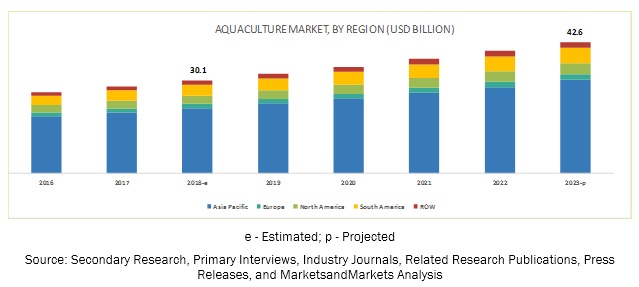
The Asia Pacific region is projected to account for the largest share in the aquaculture market during the forecast period.
Asia Pacific accounted for the largest share in the market. This is attributed to a rise in demand for advanced and latest aquaculture products that help in producing more quality output with available land for aquafarming and enhance the efficiency of aquaculture operations. Further, aquaculture sectors in countries such as China, India, Vietnam, Indonesia, and Thailand are export-oriented; the aquafarming sector is of prime importance in these countries, as players here are focusing on technology adoption and automation which is expected to have a positive impact on the market in this region.
Key Recent Developments
In August 2019, AKVA Group set up a feed conveyor concept by the name of flexible feeding, which would allow farmers to send and feed silo to any cage, making it easier to use different feed types and sizes.
AKVA Group entered into an agreement in June 2018 to acquire Egersund Net AS (Norway) to expand its product portfolio.
In June 2017, Pentair plc set up a new facility of 87,000-square feet for aquafarming at its Schmidt's brewery building in St. Paul, Minnesota, US.
In November 2016, Pentair Aquatic Ecosystems acquired Vaki Aquaculture Systems Limited (Iceland) to enhance its product portfolio of aquaculture systems, products, and services.
Aquaculture System Technologies, LLC, launched the Endurance filter for home and koi ponds in May 2016
Global Fisheries and Aquaculture Universities:
Shanghai Fisheries University, China
National Fisheries University, Japan
Agricultural University of Norway, Norway
Chulalongkorn University, Thailand
Deakin University, Victoria
Linders University, Australia
Ocean University, China
Nagasaki University, Japan
Hokkaido University, Japan
Heriot-Watt University, United Kingdom
James Cook University, Australia
Malaspina University-College, Canada
Northern Territory University, Australia
Rhodes University, South Africa
State University of Ghent, Belgium
Shanghai Ocean University, China
Kyoto University, Japan
Ehime University, Japan
Memorial University, Canada
Auburn universities, US
Brunswick Community College, United States
Delaware State University, United States
Hofstra University, United States
Humboldt State University, United States
Global Fisheries and Aquaculture Research Institutes
Andalusia Centre for Marine Science and Technology, Spain
Bureau of Fisheries and Aquatic Resources, Philippine
Central Institute of Brackish Water Aquaculture, India
Central Institute of Fisheries Technology, India
Central Marine Fisheries Research Institute, India
Deep Bay Marine Field Station, Canada
Fisheries Research and Development Corporation, Australia
Fisheries Research Services Marine Laboratory, UK
Global Ocean Ecosystem Dynamics, Chile
Korea Institute of Maritime and Fisheries Technology, South Korea
National Fisheries Research & Development Institute, South Korea
Marine Institute Ireland, Ireland
Funding Agencies:
Food and Agriculture Organization of the United Nations, USA
Taiwan Fish Society, Taiwan
Malaysian Fisheries Society, Malaysia
National Oceanic and Atmospheric Administration
Conference Highlights
- Aquaculture and Fisheries - Facts/Methods
- Animal Welfare in Aquaculture
- Sustainability in Aquaculture
- Aquaculture Nutrition
- Environmental Impacts in Aquaculture
- Aquaculture Disease and Health Management
- Techniques in Aquaculture Engineering
- Fishery Resource Analysis and Monitoring
- Marine Ecology and Biological Oceanography
- Aquatic and Marine Pathology
- Aquatic Resources and Water Management
- Engendering Security in Aquaculture
- Interaction Between Aquaculture and Fishery
- Genetic Biodiversity in Aquaculture
- Fisheries Sciences
- Shellfish Farming
- Aquaculture Economics & Management
- Fisheries Biology & Management
- Recirculating Aquaculture Systems
- Aquatic Toxicology
- Improving Technologies in Aquaculture
To share your views and research, please click here to register for the Conference.
To Collaborate Scientific Professionals around the World
| Conference Date | November 04-05, 2020 | ||
| Sponsors & Exhibitors |
|
||
| Speaker Opportunity Closed | |||
| Poster Opportunity Closed | Click Here to View | ||
Useful Links
Special Issues
All accepted abstracts will be published in respective Our International Journals.
- Journal of Fisheries & Livestock Production
- Journal of FisheriesSciences.com
- Journal of Aquatic Pollution and Toxicology
Abstracts will be provided with Digital Object Identifier by

